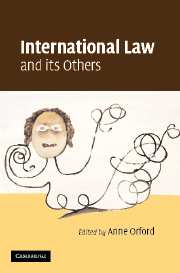Book contents
- Frontmatter
- Contents
- Acknowledgments
- Notes on the contributors
- 1 A jurisprudence of the limit
- PART I Sovereignty otherwise
- PART II Human rights and other values
- 6 Reassessing international humanitarianism: the dark sides
- 7 Trade, human rights and the economy of sacrifice
- 8 Secrets of the fetish in international law's messianism
- 9 Human rights, the self and the other: reflections on a pragmatic theory of human rights
- PART III The relation to the other
- PART IV History's other actors
- Index
8 - Secrets of the fetish in international law's messianism
Published online by Cambridge University Press: 20 July 2009
- Frontmatter
- Contents
- Acknowledgments
- Notes on the contributors
- 1 A jurisprudence of the limit
- PART I Sovereignty otherwise
- PART II Human rights and other values
- 6 Reassessing international humanitarianism: the dark sides
- 7 Trade, human rights and the economy of sacrifice
- 8 Secrets of the fetish in international law's messianism
- 9 Human rights, the self and the other: reflections on a pragmatic theory of human rights
- PART III The relation to the other
- PART IV History's other actors
- Index
Summary
The ‘imploring eyes’ of the Rwandan child, whose photograph is shown to obtain money but who ‘is now becoming more and more difficult to find alive,’ may well be the most telling contemporary cipher of the bare life that humanitarian organizations, in perfect symmetry with state power, need.
Is it possible to write within the European international law tradition and not foreclose dialogue on peace and humanity with other peoples who do not share these cultural and theological conventions? International law scholarship would seem to have turned to its historical and cultural beginnings as a way of rethinking its position in a world politics in which the international lawyer is, impossibly, called upon to legitimate excess of power, and to serve as the guarantor of excess's legitimacy. The theme of international law as having a messianic logic seems to have been a way of rethinking the present, and preserving some hope for a future. Whether this hope is for a more ethically positioned profession for the lawyer, for a discipline less trammelled by the excess of Western power and self-aggrandizement, or for the coming of a safer political order, has not been clear.
How does one retrieve the cultural origins and meanings of messianism in European culture and politics without, once again, privileging a European or Western order in which the figure of Christ as saviour has already been deployed endlessly over the past two millennia to shore up the West against other peoples?
- Type
- Chapter
- Information
- International Law and its Others , pp. 197 - 220Publisher: Cambridge University PressPrint publication year: 2006

